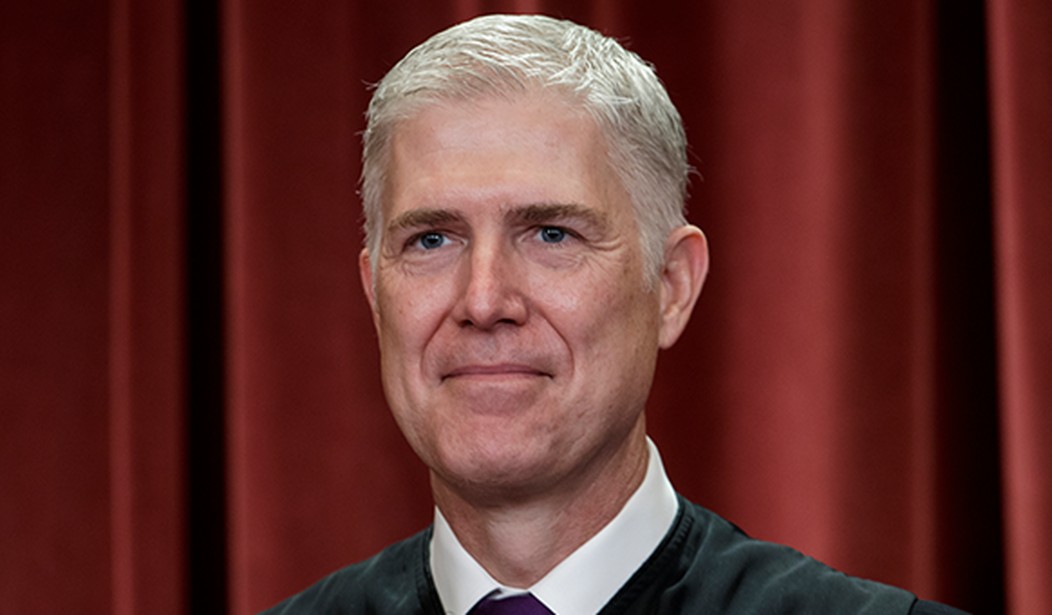Editor's Note: This piece was co-authored by David Feder.
Today is the three-year anniversary of Justice Gorsuch’s swearing-in as an Associate Justice of the Supreme Court of the United States. Although still early, Justice Gorsuch has already proven to be a grand slam for anyone who cares about interpreting the Constitution as written; for anyone who cares about the differences between judges and legislators; and for anyone who cares about protecting individual liberty.
As a judge on the Tenth Circuit Court of Appeals in Denver, Justice Gorsuch was widely recognized as a leading proponent of the judicial philosophy known as “originalism.” That term is simply a fancy label for a straightforward concept: judges should adhere to what’s in the Constitution and not what isn’t. An originalist understands that the people themselves decided what rights should be removed from the democratic process when they adopted the Constitution; it is not for a handful of unelected judges to change that bargain. As then-Judge Gorsuch eloquently put it: the Constitution “isn’t some inkblot on which litigants may project their hopes and dreams,” but rather “a carefully drafted text judges are charged with applying according to its original public meaning.”
After his elevation, the Justice has remained true to that philosophy. Time and again when confronting a constitutional question he has refused to make it up or rule based on his personal policy preferences. Instead, he’s rolled up his sleeves and done the hard work of parsing the litany of sources that bear on the Constitution’s original meaning. As former law clerks, we can attest that he leaves no stone unturned in his search for the original understanding. It is not always glamorous or easy but the Justice does it cheerfully all the same. He does the hard work in every case, even if some might not think the case terribly important. Indeed, a review of his record will reveal that he has practiced originalism across the board, whether analyzing the Contracts Clause (Sveen v. Melin), the Double Jeopardy Clause (Gamble v. United States), the Fourth Amendment (Carpenter v. United States), or some other provision still.
Recommended
This faithful adherence to originalism means that Justice Gorsuch has become one of the Supreme Court’s fiercest defenders of individual liberty. That is no accident, of course. To the Justice, originalism is all about “ensuring that the liberties the people enjoyed at the founding remain no less secure today.” Consider Sessions v. Dimaya, for example. There, Justice Gorsuch determined that the Due Process Clause, as originally understood, meant that people must have fair notice of the law’s demands before the government can deprive them of their life, liberty, or property. Accordingly, he rejected the government’s attempt to deport a lawful permanent resident under a “law so vague that reasonable people cannot understand its terms and judges do not know where to begin in applying it.”
Or take Kisor v. Wilkie. There, the Department of Veterans’ Affairs—an executive agency—asked the judiciary to defer to its reading of its own regulation, with the result of denying certain disability benefits to an injured Marine. Justice Gorsuch penned a powerful opinion explaining that judicial deference to an agency’s legal interpretation was inconsistent with the original understanding of the Constitution. After scrutinizing the historical sources, he concluded that the Constitution guarantees the people an independent judge who will decide legal questions impartially and without deference to political actors like agencies. The founders knew, he explained, that allowing political actors to bend the meaning of laws risked exposing unpopular groups to disfavored treatment even when they had complied with the law as written on the books.
The record is already clear. Justice Gorsuch’s three years on the Court have shown him to be exactly who he was as a judge on the Tenth Circuit: a faithful servant to the Constitution. We are lucky to have him on serving on the Supreme Court—today and for decades to come.
David Feder, co-author (with Justice Gorsuch) of A Republic, If You Can Keep It, is an appellate attorney in the Los Angeles. Mike Davis, former chief counsel for nominations to the Senate Judiciary Committee, is the founder and president of the Article III Project (A3P). Both Feder and Davis are former law clerks to Justice Gorsuch, at both the Tenth Circuit and Supreme Court.
























Join the conversation as a VIP Member